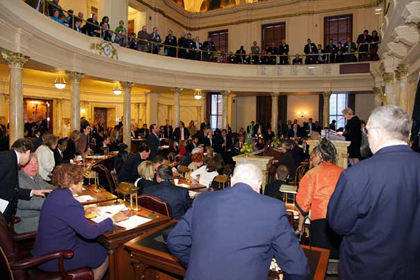
“James Zadroga 9/11 Health and Compensation Act of 2010,” Named for Bergen Resident, Would Provide Health Benefits for First Responders
TRENTON – A resolution sponsored by the Democratic members of the Bergen County delegation in the State Senate – Senators Loretta Weinberg Paul A. Sarlo and Bob Gordon – which would urge Congress to enact H.R.847, known as the “James Zadroga 9/11 Health and Compensation Act of 2010” after a Bergen County first responder and NYPD officer who died due to complications from working at Ground Zero in the aftermath of the September 11 terror attacks was unanimously approved by the Senate Budget and Appropriations Committee today.
“In America’s darkest hour, James Zadroga and thousands of other courageous Americans took up the call to duty and headed to Ground Zero to help in clean-up and recovery efforts,” said Senator Weinberg, D-Teaneck. “Nine years after the September 11 attacks, Americans are still dealing with the after-effects, including long-term health problems caused by exposure to airborne toxins, and post-traumatic stress. America owes a debt of gratitude to the brave men and women who answered the call to service, and I think it’s absolutely shameful that Republicans in the U.S. Senate are holding up this bill in order to force reauthorization of Bush-era tax cuts for the wealthy.”
“The stand-off in the U.S. Senate over the ‘James Zadroga Health and Compensation Act’ is a question over our priorities,” said Senator Sarlo, D-Wood-Ridge, who serves as chair of the Senate Budget Committee. “I tend to think it’s more important to honor the heroic sacrifices of our September 11 responders than it is to extend tax cuts for wealthy Americans. Hopefully, the Republican U.S. Senators who are blocking this bill will come to their senses and vote with their Democratic counterparts to create a health care safety net for emergency responders and volunteers who are paying the ultimate price for freedom.”
“This is a matter of fundamental fairness for people in New Jersey and around the country who put themselves in harm’s way to aide in recovery and clean-up efforts from the September 11 terror campaign against America,” said Senator Gordon, D-Fair Lawn. “Our nation owes so much to those who worked diligently to help America recover, and the least we can do is provide resources and treatment for folks who are dealing with long-term medical conditions resulting from their work at Ground Zero. While the ‘James Zadroga Health and Compensation Act’ received bipartisan approval in the House of Representatives, it’s time for the U.S. Senate to stand with our responders and provide necessary medical monitoring and treatment.”
The Senators’ resolution, SR-911, would urge Congress to enact the “James Zadroga 9/11 Health and Compensation Act of 2010,” named for a North Arlington resident who developed respiratory problems tied to exposure to a toxic mix of chemicals, jet fuel, asbestos, lead, glass fragments and other debris at Ground Zero. Mr. Zadroga was among the first individuals who died as a result of health care complications resulting from his work at Ground Zero, and at present, 98 individuals who worked at Ground Zero have passed away from a variety of reasons, including respiratory disease and cancer. Nearly 14,000 World Trade Center responders are currently receiving treatment just this year, and 71,000 individuals are enrolled in a registry operated by the New York Committee for Occupational Safety and Health to study the long-term physical and mental health effects of September 11.
The “James Zadroga 9/11 Health and Compensation Act of 2010” passed the House of Representatives on September 29, 2010 by a vote of 268-160. On December 9, 2010, a vote to end a Republican filibuster on the measure fell three votes short of the 60 votes needed to end debate and force an up or down vote on the bill.
SR-911 now heads to the full Senate for consideration. If approved, a duly-authenticated copy of the resolution would be transmitted to Congress and filed with the Secretary of the Senate.

